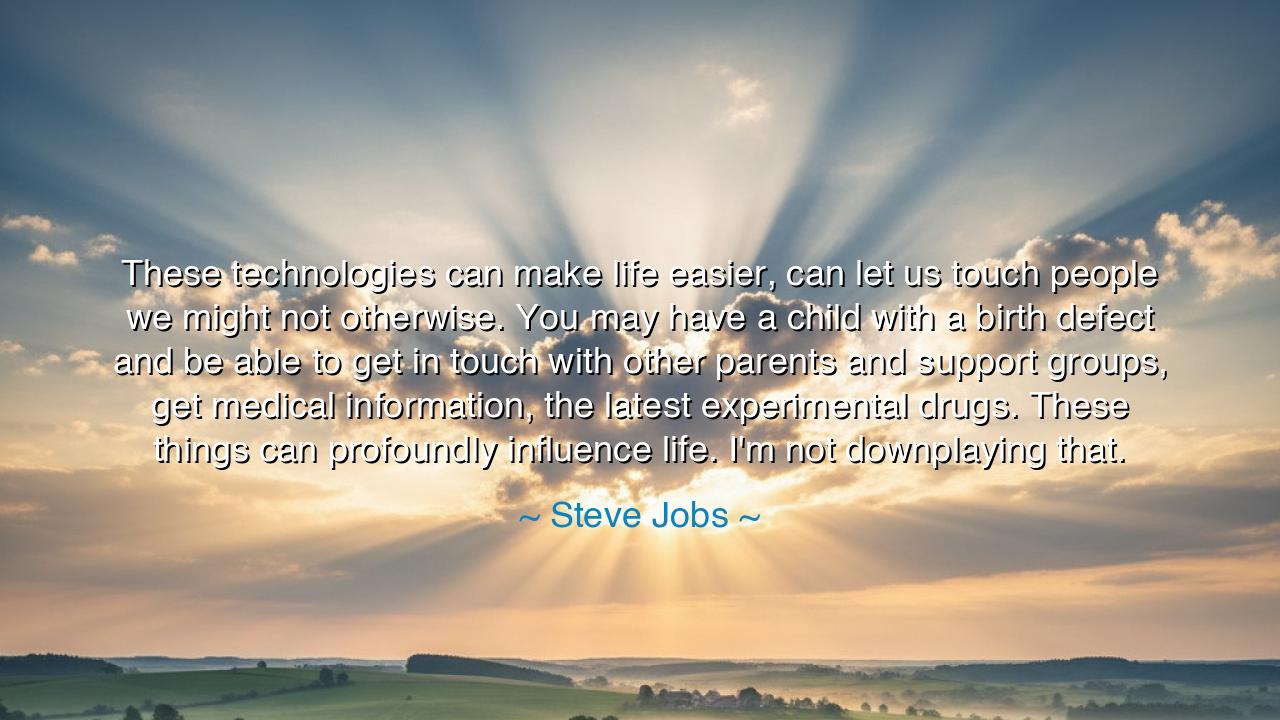
These technologies can make life easier, can let us touch people
These technologies can make life easier, can let us touch people we might not otherwise. You may have a child with a birth defect and be able to get in touch with other parents and support groups, get medical information, the latest experimental drugs. These things can profoundly influence life. I'm not downplaying that.






In the words of Steve Jobs, "These technologies can make life easier, can let us touch people we might not otherwise. You may have a child with a birth defect and be able to get in touch with other parents and support groups, get medical information, the latest experimental drugs. These things can profoundly influence life. I'm not downplaying that." Jobs, the visionary who forever changed the landscape of technology, speaks here of the profound potential of modern innovations, particularly in the realm of communication and medicine. Technology, when wielded with intention and care, can bridge the gaps between individuals and communities, offering solutions to problems that once seemed insurmountable. Jobs acknowledges the power of these tools to transform lives and provide support and knowledge that could make all the difference in the world.
The ancients understood the transformative power of tools and knowledge, even if they lacked the technologies we possess today. Socrates taught that the pursuit of wisdom was the highest goal, and he believed that, with the right tools—be it philosophy, dialogue, or rhetoric—human beings could shape their world and overcome great challenges. Jobs echoes this idea, showing that technology, like wisdom, can be harnessed for profound good. Just as the ancient philosophers sought to improve life through the mastery of knowledge, today’s technologies offer us an opportunity to transform how we connect with one another and tackle the obstacles we face, whether personal, societal, or medical.
Consider the tale of Archimedes, the great Greek inventor and mathematician, who famously used a simple tool, the lever, to move the world. Though Archimedes lived in an age far removed from modern technologies, his innovative mind saw the potential of simple machines to solve complex problems. Jobs's quote is an echo of this spirit, as technology—like Archimedes’ tools—has the potential to solve problems, ease burdens, and improve lives in ways that were once unimaginable. The tools we use today—whether smartphones, computers, or medical devices—offer us the same promise that Archimedes saw in his levers: that with the right tools, human beings can conquer seemingly impossible challenges.
In the story of Hippocrates, the father of medicine, we find a similar recognition of the potential of tools—in his case, medical knowledge—to profoundly affect lives. Hippocrates was among the first to advocate for the systematic study of disease and the use of medical techniques to understand and treat ailments. Though his tools were limited by the medical knowledge of his time, his legacy has shaped the very foundation of modern medicine. Jobs’s reflection on technology mirrors Hippocrates’ belief in the power of knowledge and tools to heal and transform lives. Hippocrates may not have had access to the technologies we have today, but his commitment to advancing medical practice laid the groundwork for innovations that could one day offer even greater solutions for humanity.
Yet, as with all tools, the true power of technology lies not in the device itself but in how it is used. Jobs emphasizes that these technologies are not without their potential to transform lives, but only if we approach them with care, intention, and compassion. The ancients were aware of the dangers of unchecked power, whether it was in the hands of rulers or the pursuit of knowledge. Plato warned in his Republic that unchecked knowledge and power could lead to tyranny, and thus, it was important for the philosopher to possess both wisdom and virtue. Similarly, Jobs reminds us that while technology can profoundly impact our lives, it must be guided by a sense of responsibility, compassion, and ethical consideration.
The lesson Jobs imparts is clear: while technology is a powerful force, its true value lies in its application. It is not the tool that defines its worth but the intention with which it is used. Just as Hippocrates and the ancient philosophers understood that knowledge without virtue is empty, so too must we understand that technology without humanity is hollow. The tools that have been crafted, whether for medicine or for communication, must serve the greater good, helping us not only to solve problems but to connect in ways that improve the quality of life for all.
In our own lives, we can take this lesson to heart by using the technologies at our disposal to create more meaningful connections and to address the challenges that face us. Whether it is through medicine, education, or the cultivation of new relationships, we must use technology as a force for good. We must also ensure that our tools serve the greater human purpose, helping to heal, unite, and enrich the lives of those who need it most. Just as Jobs believed, let us not downplay the potential of technology, but let us use it with wisdom, care, and the intention to create a world where the human spirit can flourish, no matter the challenges we face.






AAdministratorAdministrator
Welcome, honored guests. Please leave a comment, we will respond soon